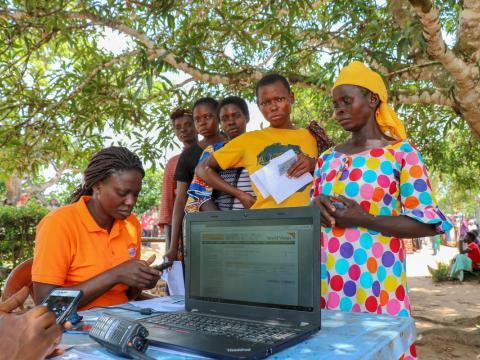Can cash programming save us?

By Amos Doornbos, Director, Disaster Management Strategy and Systems
My son likes carrots and my daughter likes cucumbers, they both hate parsnips. In the past, we have had farmer-supplied veg box schemes. Many weeks our box had lots of parsnips and kale – no carrots or cucumbers. Many aid distribution programmes are like the veg box; you take what you get, then you swap and barter to get what you want and need.
We don’t have a problem doing this with a veg box scheme, but weirdly we struggle to accept it when aid recipients do the same thing. When they take the aid given and try to sell it in the marketplace so they can use the cash to buy what they need or want, we get upset. We call it profiteering.
It doesn’t have to be this way.
Underlying the humanitarian principles is the idea of treating those affected by a crisis with dignity. A fundamental belief that all humans, regardless of race, religion, or circumstance, deserve dignified interaction. The recent pandemic reminds us we all have still have work to do. And while dignity can be defined in different ways, for me it is closely associated with choice.
That is one of the many reasons cash programming will ‘save’ humanitarian aid. Yes, it is not perfect and could threaten aspects of our humanitarian principles (which always should be evolving), but fundamentally it will remake aid and reinterpret the humanitarian principles for the 21st century. We are just at the beginning.
Organisationally cash programming can help reduce operational and implementation costs. We still have a long way to go yet as we all cling on to old models and try to adapt cash programming to fit them. When cash programming is freed from the restrictions of older forms of in-kind distribution logistics models we will reap the benefits. We are beginning to see more network and system thinking, but this needs to grow. Too many networks are still structured in traditional consortium models.
More importantly, beyond organisations, cash programming can enable choice for those we seek to serve. Many, if not most, of us believe that we know what we, our family or our household needs better than someone outside. This doesn’t mean that we are not open to learning from others, it just means that we tend to think we know what is best for those we do life with. And that we would like to be able to make the choices for ourselves. If this is taken away from us, we feel some of our dignity is stripped away.
So when we use cash and voucher programming as a means of delivering aid, we are promoting this belief. We enable households to choose the food they want and in some cases even the shops they buy from (because we all have our favourite shops!).
And cash can be a listening device. When we provide ‘cash without strings’ and then watch to see how people spend it, we learn a lot. We learn about their priorities, the power dynamics, and likely a lot about our assumptions. This has never been more important. World Vision’s recent Out of Time report, based on rapid global assessment of the aftershocks of the COVID-19 pandemic, found 69% of all respondents are experiencing an over 50% drop in their income and are turning to negative coping mechanisms. These are people who know what their needs are and each household’s needs are going to be slightly different than their neighbour. If we provide them cash, we’ll learn about their priorities and trusted shops quickly.
Ultimately cash programming will ‘save’ humanitarian aid when across the board, we decide it is ok for the people affected by crisis to tell us what they want in kind and what they want as cash. And each household can choose differently. Perhaps this is what it truly means to put our beneficiaries at the centre of our work.
When we believe they are like us, cash programming and humanitarian aid can thrive. The choice is up to us.
www.thisisamos.com/blog/